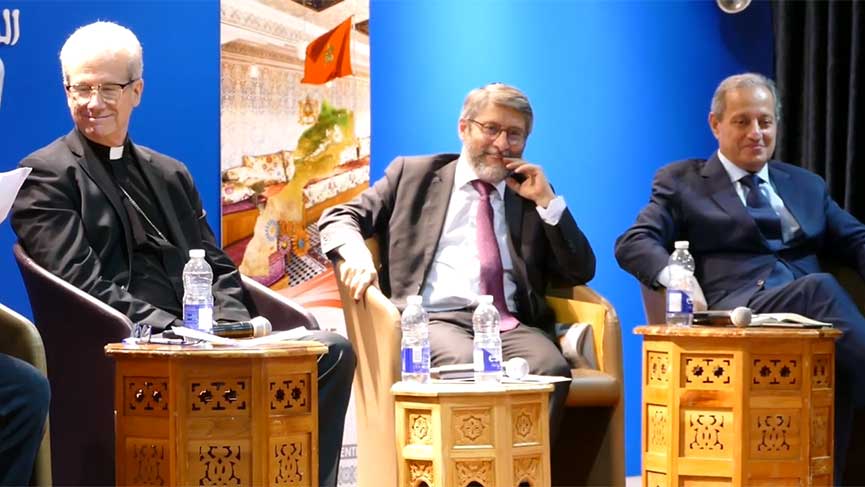Children of Abraham

Montreal
On the occasion of a visit to Montreal this summer by Chief Rabbi of France Haïm Korsia, the Unified Sephardic Community of Quebec (Communauté Sépharade Unifiée du Quebec) and the Canadian Sephardi Federation coordinated an encounter at the Moroccan cultural centre Dar Al Maghrib. With journalist Élias Lévy moderating, Chief Rabbi Korsia, Archbishop of Montreal Christian Lépine and Dr. Faouzi Skali, founder of the Fez Festival of world sacred music, discussed together the legacy of Abraham.
by Louise-Édith Tétreault (Translated by the Archdiocese of Montreal)
Haïm Korsia
Abraham presents an example of God’s hospitality. Dialogue is not some concession to modern sensibilities; it is what God has wanted since the beginning. As children of Abraham, what can we derive from this common kinship so that we can build something that we can pass on? I came across these words of Elie Wiesel at the Holocaust Museum, “To live an experience without passing it on is to betray it.” When we engage in dialogue not knowing what the others may say, we must accept that part of our truth must die so that we can embrace that of the other.
Msgr. Lépine
I thank God for these encounters, where I always experience the happiness of being together; it is a blessing from God. Among Abraham’s lessons is this: that things take time, and we must pass through experiences of suffering and defeat. Faith is a way of looking at God and at others. I look at others as brothers and sisters because, at the source, there is only one God, and we are all his children, as similar as we are different. I have a dream of peace. We must not doubt that it is possible and simply surrender. We are made for peace, and peace resonates within our hearts. Too often, we speak of others without knowing anything about them. Whenever I have met people about whom I had a preconceived notion, the preconception has fallen apart, and my perception has been altered. I have discovered that we have aspirations in common. God himself invites us to engage in this encounter, through which we have so much to learn from one another.
Too often, we speak of others without knowing anything about them.
-Christian Lépine
Dr. Faouzi Skali
The eight centuries of friendly cohabitation in Andalusia should be an example to inspire us, particularly when we consider the dialogue that flourished among the great thinkers of that age, such as Maimonides and Averroës. They strove to live in both reason and faith together, in humanism as well as spirituality. This is what makes all the difference when we encounter another, and it makes an even greater difference when we share important moments of life with that person. As long as the other is merely a remote object, we can make all kinds of projections onto the person, imagining the worst. We must transform that relationship between subject and object into one of subject and subject. Morocco is heir to that culture of dialogue, exemplified in the invitation extended to the Chief Rabbi of France by a Moroccan government cultural centre, which is equally home to Moroccan Jews. A response must be found to speak to the distress that young people are experiencing, by organizing encounters among our three religions, recognizing our common values, including respect and dignity. To accomplish this, we must create concrete initiatives.
Knowledge of the other is not gained through arguments. At the Festival of sacred music of the world, individuals enter into communion with one another thanks to the power of music to bring people together. This is one example of how communion can arise based on spiritual values and without proselytizing.
Algorithms recommend content similar to what we have already seen, thus enclosing us inside ourselves.
-Haïm Korsia
Haïm Korsia
Peace is a thing that is built. Not the peace of cemeteries. Someone said to David, “Go in peace.” This means that a movement comes into being, which is itself an acceptance of the fact of imperfection. In Judaism, perfection is perfectibility, the possibility that things can be made better. When I was elected, along the commitment to fight antisemitism, my desire was to fight all types of prejudice. So, I began by inviting priests, pastors and imams to visit our Jewish schools to uproot prejudices there. And we must not be naïve, our young people are not innocent of prejudice. What kinds of prejudices did these priests and pastors and imams encounter? The institutions’ directors were disapproving, until I explained to them that it was a condition of their contract with the State, at which point they understood somewhat better (audience laughs).
The eight centuries of friendly cohabitation in Andalusia should be an example to inspire us, particularly when we consider the dialogue that flourished among the great thinkers of that age, such as Maimonides and Averroës.
-Faouzi Skali
And so, the young people learned about the others, and at the same time they learned about themselves, as well. This is why encountering the other is so precious. The exact opposite of what Facebook does, corralling us together with others who think the same as we do: or algorithms that recommend content similar to what we have already seen, thus enclosing us within ourselves. Encounters with what exists outside have to be imposed. This is what God commanded Abraham to do: Go from Ur in Chaldea to the changing horizon of the unknown land that I will show you.
Malek Chebel, Haïm Korsia & Alain Maillard de la Morandais, Les enfants d’Abraham, Presses de la Renaissance, 2011

Comment
Comment
Add new comment